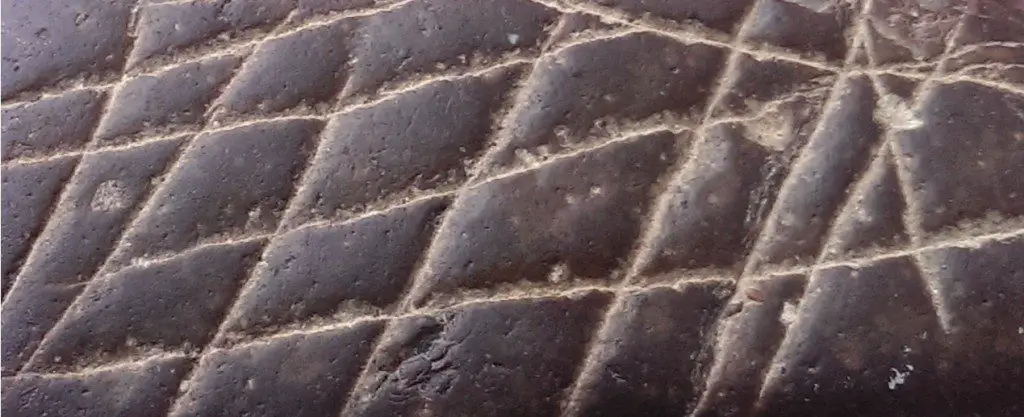12th August 2014
By Steven & Evan Strong
Contributing Writers for Wake Up World
Recently, a woman named Ros contacted us regarding a stone artefact in her possession. Ros’ account of how this amazing relic was found, and her experience with mainstream academics was compelling, but until we could examine the rock ourselves, we were not prepared to pass any judgement as to whether it was genuine.
Michael Tellinger and Louise Clarke were spending a day with us viewing a variety of sites we are researching, and we decided it would be in the spirit of sharing and of great assistance if we asked Michael and Louise if they would also like to examine the rock. We arranged for Ros to meet us later, at the end of our research day, at an agreed point and approximate time.
First Impressions
[pro_ad_display_adzone id=”110028″]
During our day working on country, we showed Michael and Louise photographs of this enigmatic rock and they were certainly very keen to inspect it. What struck Michael was the delicacy of cut and the similarities to the Blombos Rocks of South Africa. This was a touch difficult for us to come to grips with as we had no idea what these rocks were, or that they even existed. Michael spoke of the Blombos stones in such a casual manner, as if such news was well known, and it may well be the case elsewhere but certainly not by us. A shared glance, shrug and raised eyebrow left us none the wiser.
Steven: I momentarily entertained the idea of bluffing my way through and feigning familiarity, but such was Michael’s enthusiasm and talk of the incredible antiquity of these South African stones, I swallowed my pride and pleaded complete ignorance.
Among his many qualities, Michael is obviously a very patient man. He took us through a ‘101 introduction’ of the African stones he has personally seen and, in a fascinating extension of timing, explained that the stones are generally agreed in mainstream circles to be somewhere between 75-100,000 years old — perfectly synchronized with our estimates of comparable Original artefacts. It is claimed that the Blombos engravings are the very earliest evidence of Homo sapien art/communication yet found in the world, and promisingly, looking at these photographs, Michael’s first impression was that the lines and patterns evident on Ros’ stone could be of a higher standard.
We met Ros at the end of the day and what we saw, filmed and touched – and in one case kept – far exceeded our expectations.
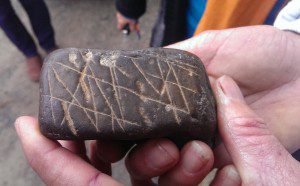 This following discussion is admittedly a work in motion, and will be followed up after further consultation. For now but we believe the stone is so unusual it can virtually ‘speak for itself’ and needs little description, interpretation or commentary on our part.
This following discussion is admittedly a work in motion, and will be followed up after further consultation. For now but we believe the stone is so unusual it can virtually ‘speak for itself’ and needs little description, interpretation or commentary on our part.
Ros’ Rocks
According to Ros, the rock was found in 1990 during excavations while building a new brick home on a piece of land located within two kilometres of the Bambara Hieroglyphs. Found approximately one metre beneath the surface, it is clear this rock is not part of the local assemblage. Above and below and in every direction, all rocks near and far are sandstone, and yet this rock is neither sedimentary nor sandstone.
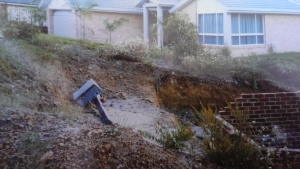 From the very first sighting Ros was aware that the rock didn’t belong to the Kariong/Bambara geology, but the markings on three sides was understandably the main focus of her interest. Not only was there evidence that tools of the highest refinement were in application, there was also on display a delicate touch and considerable artistic talent. This lead Ros to wonder: how was is made?
From the very first sighting Ros was aware that the rock didn’t belong to the Kariong/Bambara geology, but the markings on three sides was understandably the main focus of her interest. Not only was there evidence that tools of the highest refinement were in application, there was also on display a delicate touch and considerable artistic talent. This lead Ros to wonder: how was is made?
In the 20 years since she first discovered this stone, Ros has made numerous unsuccessful attempts to answer that question. ‘Experts’ Ros consulted with acknowledged the markings were clearly the work of human hands and sophisticated technology, but as any theory that could account for this artefact sat well outside the realm of all accepted accounts of Original pre-history, typically no further opinion was offered. It seems it was easier to walk away than to seriously consider evidence that might prove mainstream beliefs and assertions incorrect.
Although unwilling to venture far outside the ‘academic box’, one of the ‘experts’ Ros met did state that he believed the rock to be ironstone. Our resident geological advisor and ex-professor in geology, although limited by only having access to photographs, believes it is not ironstone but something even harder. Having held and viewed it close up, all we can add is that this stone is extremely hard with small compact grains, and would undoubtedly require a chisel of considerable refinement and strength to cut into such a hard surface. So where did this stone come from?
Although not prevalent in the region, Original Custodian David Fitzgerald has informed us that there are two small deposits of ironstone relatively nearby, protruding out of the sandstone at Umina Beach and Dalley’s Point NSW. During our next trip down to that area, comparisons will be made between the engraved rock and both deposits.
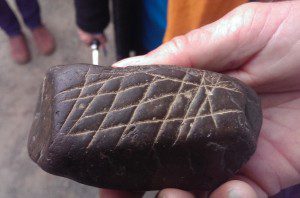 Until then, what can be stated with certainty is the hard rock, intricate designs and time given in reverence in creating this sacred object necessitates the existence of an Original technology of sophistication, evidence of which is now so much the norm, in this area and many other locations across the country. Being either ironstone or something harder, with dozens of fine deep incisions, and found a metre beneath the surface automatically rules out the use of post-Cook technology in its creation, and equally, of any Original rock-stick-and-bone tool kit.
Until then, what can be stated with certainty is the hard rock, intricate designs and time given in reverence in creating this sacred object necessitates the existence of an Original technology of sophistication, evidence of which is now so much the norm, in this area and many other locations across the country. Being either ironstone or something harder, with dozens of fine deep incisions, and found a metre beneath the surface automatically rules out the use of post-Cook technology in its creation, and equally, of any Original rock-stick-and-bone tool kit.
The Blombos Rocks… an Inferior Imitation?
In addition to the first three rock artefacts she showed us, Ros also presented us with two documents detailing similar finds in other parts of the globe. First up, and there were no surprises here, Ros presented photographs and some commentary on the Blombos Rocks. We could now see why Michael made the comparison, and who were the novices in this exchange. The markings on the Kariong/Bambara rock were indeed much finer and more pleasing to the eye.
Artistic merit aside, what was also evident was the softer grain of the Blombos Rocks. From a simple photographic comparison it is obvious that the Kariong/Bambara rock is a much harder type of stone; so hard that its deep incisions demand the use of a hardened tool – no less than an iron blade. This fact was no doubt the stumbling block for those ‘experts’ Ros consulted; according to universities and school text books, until the British Invasion of the late 1700’s no such tool was manufactured inside this continent. And yet there sat the end product, a metre below the established ground surface. Although we have more work to do, our first assessment is that this artefact alone may rewrite large sections of Original pre-history.
Leaving aside its questionable origin and sophisticated creation, and the reluctance of experts to venture into such unexplored territory, there is something that further accentuates the importance of this rock; another article Ros had found while researching. According to this article, discovered in China was a “stunning 30,000-year-old engraved stone artefact” which was half the size of this one, of a less precise line, and had one-tenth the amount of engraving. In fact it barely scratched into the surface when compared to what was in my hand. It may have been regarded as “stunning” in China, but in Australia, with Ros’ rock acting as the yard stick, it is underwhelming in comparison and barely rates a mention.
One of the other rocks had a particular appeal for Michael, which is his story alone. It too was extremely important for quite different energetic reasons and, until Ros’ intervention, was bound to be sold on the open market and stored in a private overseas collection.
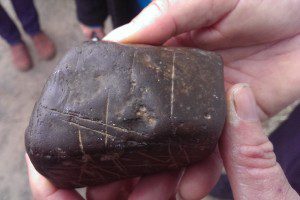 What did resonate for us was learning from Michael and Ros that the Blombos rocks are claimed to mark humanity’s first venture into recording art and communication for posterity, and could be up to 100,000 years old. If so, where does that place the Kariong/Bambara rock in the great scheme of things? Is it older? And was it the inspiration behind the Blombos Rocks, which could be merely cruder copies of the original? Or is it younger, the result of a more refined, developing technology? What tools were used to engrave this rock? (we use the plural in this case as there seem to be indications that more than one type of blade was in use) Who created it? And why?
What did resonate for us was learning from Michael and Ros that the Blombos rocks are claimed to mark humanity’s first venture into recording art and communication for posterity, and could be up to 100,000 years old. If so, where does that place the Kariong/Bambara rock in the great scheme of things? Is it older? And was it the inspiration behind the Blombos Rocks, which could be merely cruder copies of the original? Or is it younger, the result of a more refined, developing technology? What tools were used to engrave this rock? (we use the plural in this case as there seem to be indications that more than one type of blade was in use) Who created it? And why?
Once More into the Breach
Not only does this artefact potentially sit outside the embrace of accepted versions of Australian and global pre-history, but it’s presence within the earth, one metre beneath the surface, may also introduce ancient paradigms, participants and purposes to this unravelling historical equation. And although our investigation is in its preliminary stages, the question must already be asked – where to next?
First and foremost, we hope to examine the site at which this rock was found in more detail, and will continue seeking out the counsel of the Original Custodians of the Old Ways. Likewise, we will also continue seeking the advice of those academics (if any remain) who possess the open mind and inquiring disposition required to properly assess this intriguing artefact.
As always, we are also obliged to try and nudge and cajole mainstream media and academia into action. We approach this difficult task with trepidation – it is one we have tried before, with very mixed results. And until now, every time Ros has gone through ‘official channels’, a wall of inertia and denial was all she received.
But amongst all the official deflection and procrastination, there was one ray of clarity that Ros never forgot; when the sensibilities of the Old Way prevailed. Ros told us of an Original Elder who told her that, not only was the rock the genuine article, but that she was chosen by the Original spiritual guardians of the site and stone to recover, then act as the custodian of, this precious and extremely ancient artefact.
Despite our justifiable skepticism of involving instruments of the mainstream, we owe it to Ros for her determination to try – once again – to speak her truth.
Ros has also made a Statutory Declaration outlining the details of her find, and her subsequent attempts to understand it.
About the authors:
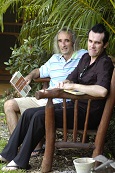 Steven Strong is an Australian-based researcher, author and former high school teacher. Evan Strong is a researcher, historian and author with a degree in the Social Sciences. Their work is to explore the ancient story of the Original people, a narrative that was almost lost to aggressive European colonisation.
Steven Strong is an Australian-based researcher, author and former high school teacher. Evan Strong is a researcher, historian and author with a degree in the Social Sciences. Their work is to explore the ancient story of the Original people, a narrative that was almost lost to aggressive European colonisation.
Edited and additional commentary by Andy Whiteley for Wake Up World.
This article © Wake Up World.
[pro_ad_display_adzone id=”110027″]

